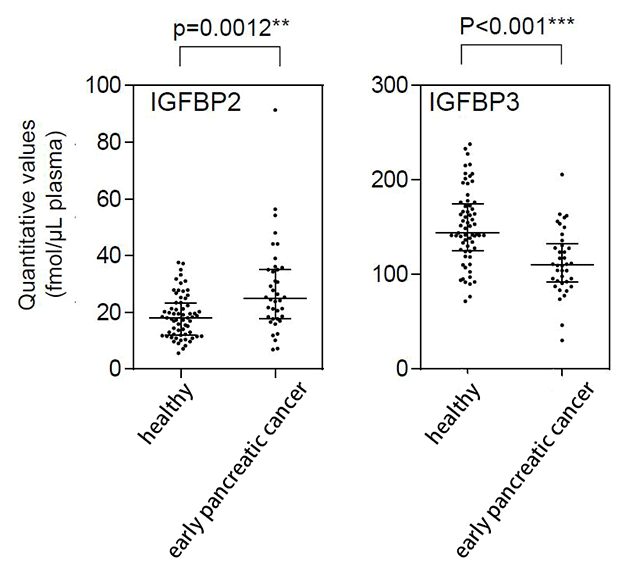News Releases & Research Results Discovery of Blood Biomarkers for Early Pancreatic Cancer Detection
News Releases & Research Results
Pancreatic cancer is one of the most lethal forms of cancer because early stage symptoms are relatively light, often resulting in it being discovered only after spreading to other organs. In order to improve the prognosis of pancreatic cancer, the development of methods for early detection of pancreatic cancer with a blood test is important. Working toward that goal, a research collaboration between Kumamoto University, Tohoku University and the National Cancer Center of Japan has discovered proteins in the blood which improve the detection of pancreatic cancer. When used in combination with conventional biomarkers, they enable the diagnosis of early stage pancreatic cancer, which was previously difficult.
NOTE
To discover biomarkers useful in detecting pancreatic cancer, the researchers decided to analyze the genes of proteins which were reported to have higher expression in pancreatic cancer tissues, as candidates. They then tested a number of clinical specimens using two types of proteomics (large-scale protein analysis techniques) technologies and analyzed the changes of candidate proteins in the blood of both pancreatic cancer patients and healthy subjects. The blood samples were collected from 10 medical institutions around Japan.
"We selected 130 proteins and their expression levels were comprehensively measured in the blood plasma of 106 healthy subjects and 164 pancreatic cancer patients using antibody-based proteomics," said lead researcher Professor Sumio Ohtsuki. "As a result, we found 23 proteins that had significantly changed in the plasma between the two groups."
The researchers used a mass spectrometer and quantitative proteomics techniques to verify the pancreatic cancer biomarker candidates through accurate and specific measurements. In order to efficiently analyze a large number of clinical samples, they developed a technique using an automated sample preparation robot, a high-throughput liquid chromatography-mass spectrometer (LC-MS/MS), and auto-analysis software. The newly developed system can accurately analyze approximately 1000 samples per week while a conventional system could only assess around 80 samples.
With their new analysis system, they compared amount of candidate proteins in the plasma of 65 healthy and 38 early pancreatic cancer subjects and were able to show that the amount of insulin like growth factor binding protein 2 (IGFBP2) and IGFBP3 changed in pancreatic cancer patients at early stages. Additionally, the IGFBP2 and IGFBP3 diagnosed 12 early pancreatic cancer patients out of 15 cases (80%), who were negative for CA19-9, an existing diagnostic marker.
Furthermore, researchers analyzed approximately 600 more samples which included various other forms of cancer. They revealed the potential of IGFBP2 and IGFBP3 to also be effective in screening for cancers such as stomach, gallbladder, colorectal, duodenal, and hepatocellular carcinoma.
"These diagnostic markers are expected to contribute to the improvement of cancer prognosis, because early detection provides patients with a better chance of complete cure through surgery." said Professor Ohtsuki. "Additionally, the new mass spectrometry system that we developed in this study is expected to make the analysis of a much large number of specimens possible in future clinical practice."
This finding was published in "PLOS ONE" on August 31st 2016.
PAPER INFO
- TITLE:
- Identification of IGFBP2 and IGFBP3 as Compensatory Biomarkers for CA19-9 in Early-Stage Pancreatic Cancer Using a Combination of Antibody-based and LC-MS/MS-based Proteomics
- AUTHORS:
- Toshihiro Yoneyama, Sumio Ohtsuki, Kazufumi Honda, Makoto Kobayashi, Motoki Iwasaki, Yasuo Uchida, Takuji Okusaka, Shoji Nakamori, Masashi Shimahara, Takaaki Ueno, Akihiko Tsuchida, Naohiro Sata, Tatsuya Ioka, Yohichi Yasunami, Tomoo Kosuge, Takashi Kaneda, Takao Kato, Kazuhiro Yagihara, Shigeyuki Fujita, Wilber Huang, Tesshi Yamada, Masanori Tachikawa and Tetsuya Terasaki
- JOURNAL:
- PLOS ONE
- DOI:
- 10.1371/journal.pone.0161009
- URL:
- http://journals.plos.org/plosone/article?id=10.1371/journal.pone.0161009
FUND
IMAGES
 Biomarker discovery for early pancreatic cancer detection.
Biomarker discovery for early pancreatic cancer detection.
 Comparison of IGFBP2 and IGFBP3 in healthy subjects and early pancreatic cancer patients
Comparison of IGFBP2 and IGFBP3 in healthy subjects and early pancreatic cancer patients
IGFBP2 is increased in the blood of early pancreatic cancer patients, while IGFBP3 is reduced. Healthy: 65 cases, Early pancreatic cancer: 38 cases
- *For both images
- CREDIT: Professor Sumio Ohtsuki
USAGE RESTRICTIONS: This image may only be used in conjunction with the accompanying release, or stories written about the work described in the release with reference to the original work. (http://journals.plos.org/plosone/article?id=10.1371/journal.pone.0161009)
Links
10/21/16
Last updated 10/21/16

